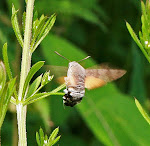'Gasteroid' is a loose term used to describe fungi in which the spores are developed within the closed fruitbodies. The result is that the spores are not forcibly dicharged but are released passively often through a central hole (ostiole) by the aid of external agents such as wind or falling rain drops. The group includes those fungi well-known as puffballs, earthstars, etc. Dunes and woodlands are typical habitats with those at Ainsdale NNR near Southport being especially rich. A few seen and photographed recently are shown here.
.jpg)
[Dunes at Ainsdale]
Lycoperdon perlatum, Common Puffball, (below) occurs either singly or in small clusters and has its outer surface delicately covered with fine spines or 'pearls'. It is widespread in Britain and very common at Ainsdale where photographed here.
.jpg)
.jpg)
.jpg)
.jpg)
[Fruitbodies from which the spores have been expelled]
.jpg)
[Above, probably the closely-related Lycoperdon nigrescens, Ainsdale dunes]
Lycoperdon excipuliformis, Pestle-shaped Puffball (below) also occurs at Ainsdale but less frequently. It mainly differs from the above in its shape as suggested by its common name. It is more elongated and taller than L. perlatum.
.jpg)
[Lycoperdon excipuliformis at Ainsdale]
Lycoperdon pyriforme, Stump Puffball, is common throughout the country and grows in woodland on strongly-decaying wood. Photographed below at Eaves Wood, Lancashire in 2008.
.jpg)
[Lycoperdon pyriforme]
Scleroderma citrinum, Common Earthball, (below) is tinged yellowish and has coarse scales or warts on its outer surface. It favours acidic woodlands and heaths and is often associated with birch, beech or oak. Here it was growing amongst scattered birch on the heath at Foulshaw Moss, Cumbria.
.jpg)
.jpg)
[Scleroderma citrinum]
Geastrum triplex, Collared Earthstar, is probably the commonest species within the genus. The expanded fruit body splits into several arched rays to reveal the onion-shaped central body. Often found on dunes or in calcareous woodland as here at Silverdale.
.jpg)
[Geastrum triplex]
.jpg)






No comments:
Post a Comment